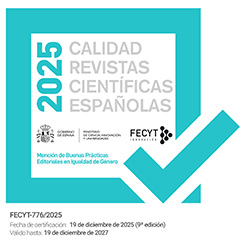Alienation and Violence in Beatriz Cabur’s Plays
DOI:
https://doi.org/10.17561/grove.v30.7675Keywords:
Beatriz Cabur, trauma, feminism, gender violence, trivialisation of pain, FemicidesAbstract
In the last decades of the 21st century, the growing interest in legitimising contemporary Spanish female playwrights is evident in the context of contemporary feminist theories. This research explores Beatriz Cabur's plays, published and performed nationally and internationally, insofar as they respond to some of the current feminist demands regarding trauma. This study delves into the need for appropriate critical and analytical models for the study of theatrical experimentalism, which, in addition to its academic value, addresses current feminist demands. The development of this study is supported by clear thematic links that are established, from which it is possible to delve into the implicit and explicit feminisms of contemporary Spanish theatre, as well as the shaping, development, and legitimisation of contemporary feminine identities.
Downloads
References
Bakhtin, Mijaíl. The Dialogic Imagination: Four Essays. Translated by C. Emerson & M. Holquist, University of Texas Press, c. 1935/1981.
Brayshaw, T., and Witts, N. The Twentieth Century Performance Reader (3rd ed.). Routledge, 2013. https://doi.org/10.4324/9780203125236
Cabur, Beatriz. Childbirth-19. (Obra teatral inedita), 2021.
Cabur, Beatriz. Goodbye, Mother. (Obra teatral inedita), 2020.
Cabur, Beatriz. The Mind-Boggling Shrinking Woman. (Obra teatral inedita), 2017.
Cabur, Beatriz. “La responsabilidad de crear un mundo igualitario.” Revista Godot, 22 Sep. 2021, https://www.revistagodot.com/la-responsabilidad-de-crear-un-mundo-igualitario/ Accessed 25 Jan. 2021.
Cabur, Beatriz. “365 Women a Year: una apuesta de futuro. Las puertas del drama.” Mujeres que cuentan. Especial autoras, 1 Extra , 2016b.
Conquergood, Dwight. Cultural Struggles: Performance, Ethnography, Praxis. Edited by E. Patrick Johnson, University of Michigan Press, 2013.
Ilter, Seda. Mediatized Dramaturgy: The Evolution of Plays in the Media Age. Methuen Drama, 2021. https://doi.org/10.5040/9781350031180
Lehmann, Hans Thies. Postdramatic Theatre. Routledge, 2006. https://doi.org/10.4324/9780203088104
Radosavljevic, D. (n.d.). Aural/Oral Dramaturgies: Theatre in the Digital Age, 2023. https://doi.org/10.4324/9781003096337
Reig González, Marta. Beatriz Cabur: Empiezas a trabajar en teatro y te da la injusticia en la cara. Amecopress Accessed 20 Jan. 2021.
Reilly, Caroline. “It’s All In Your Head: The Dangers of Disbelieving Female Pain.” BitchMedia 5 Jun. 2018, https://web.archive.org/web/20230130231734/https://bitchmedia.org/article/it%E2%80%99s-all-your-head-dangers-disbelieving-female-pain-hearken Accessed 30 Jan 2023.
Roesner, David. Musicality in Theatre: Music as Model, Method and Metaphor in Theatre-Making. Ashgate, 2014.
Roesner, David. The politics of the polyphony of performance: Musicalization in contemporary German theatre. Contemporary Theatre Review, 2008.
Serna, Carmen. “Estos Son Los 5 ´Lobbies´ Feministas Que Presionan Desde Hace años En España Para Alcanzar La Igualdad.” El Español, 15 Jul. 2023, https://www.elespanol.com/mujer/actualidad/20200312/lobbies-feministas-presionan-hace-espana-alcanzar-igualdad/464703832_0.html Accessed 2 Nov. 2023.
Sterne, Jonathan. “The theology of sound: A critique of orality.” Canadian Journal of Communication, vol. 36, no. 2, 2011. https://doi.org/10.22230/cjc.2011v36n2a2223
Published
Issue
Section
License
Copyright (c) 2023 María Herrera

This work is licensed under a Creative Commons Attribution 4.0 International License.
Authors who publish with this journal agree to retain copyright and grant the journal right of first publication with the work simultaneously licensed under a Creative Commons Attribution License that allows others to share the work with an acknowledgement of the work's authorship and initial publication in this journal. Also, authors will retain the rights on their work, even if they will be granting The Grove. Working Papers on English Studies a non-exclusive right of use to reproduce, edit, distribute, publicly communicate and show their work. Therefore, authors are free to engage in additional, independent contracts for non-exclusive distribution of the works published in this journal (such as uploading them to an institutional repository or publishing them in a book), as long as the fact that the manuscripts were first published in this journal is acknowledged.

























